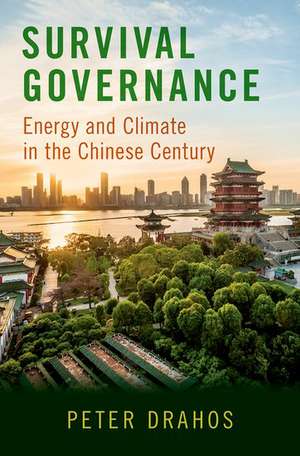Survival Governance: Energy and Climate in the Chinese Century
Autor Peter Drahosen Limba Engleză Hardback – 15 apr 2021
Preț: 221.07 lei
Nou
Puncte Express: 332
Preț estimativ în valută:
42.30€ • 44.17$ • 34.93£
42.30€ • 44.17$ • 34.93£
Carte disponibilă
Livrare economică 14-20 martie
Preluare comenzi: 021 569.72.76
Specificații
ISBN-13: 9780197534755
ISBN-10: 0197534759
Pagini: 272
Dimensiuni: 236 x 155 x 28 mm
Greutate: 0.5 kg
Editura: Oxford University Press
Colecția OUP USA
Locul publicării:New York, United States
ISBN-10: 0197534759
Pagini: 272
Dimensiuni: 236 x 155 x 28 mm
Greutate: 0.5 kg
Editura: Oxford University Press
Colecția OUP USA
Locul publicării:New York, United States
Recenzii
Drawing on more than 250 interviews, carried out in 17 countries including the world's four largest carbon emitters—Drahos shows what China is doing to make its vast urban network sustainable and why all states must work toward a "bio-digital energy paradigm" based on a globalized, city-based network of innovation.
Which political organization is most likely to deal with the potentially disastrous effects of climate change? Peter Drahos argues it is the Chinese Communist Party. This book will be intensively controversial, but if Drahos is right, his book may well be regarded as one of the most important social science works of our time, perhaps even a game changer.
Peter Drahos's extremely valuable book highlights two issues that are critical for the future of humanity in the face of climate change: the inescapable role of states in leading capitalism towards radical carbon emissions, and the ability of China to play the most important part in this effort.
Time is rapidly running out on the race to meet the climate change challenge, and it will very likely be won or lost on geopolitics, not technologies. Could China emerge as the hero in meeting this great challenge? This book explains why China may well be humanity's best hope.
Which political organization is most likely to deal with the potentially disastrous effects of climate change? Peter Drahos argues it is the Chinese Communist Party. This book will be intensively controversial, but if Drahos is right, his book may well be regarded as one of the most important social science works of our time, perhaps even a game changer.
Peter Drahos's extremely valuable book highlights two issues that are critical for the future of humanity in the face of climate change: the inescapable role of states in leading capitalism towards radical carbon emissions, and the ability of China to play the most important part in this effort.
Time is rapidly running out on the race to meet the climate change challenge, and it will very likely be won or lost on geopolitics, not technologies. Could China emerge as the hero in meeting this great challenge? This book explains why China may well be humanity's best hope.
Notă biografică
Peter Drahos is a Professor of Law and Governance at the European University Institute, Florence. He holds a Chair in Intellectual Property at Queen Mary, University of London and is Professor Emeritus at the Australian National University. He is a member of the Academy of Social Sciences in Australia. He holds degrees in law, politics, and philosophy. His publications include A Philosophy of Intellectual Property, Global Business Regulation, (with John Braithwaite), Information Feudalism (with John Braithwaite), and Intellectual Property, Indigenous People and Their Knowledge.
